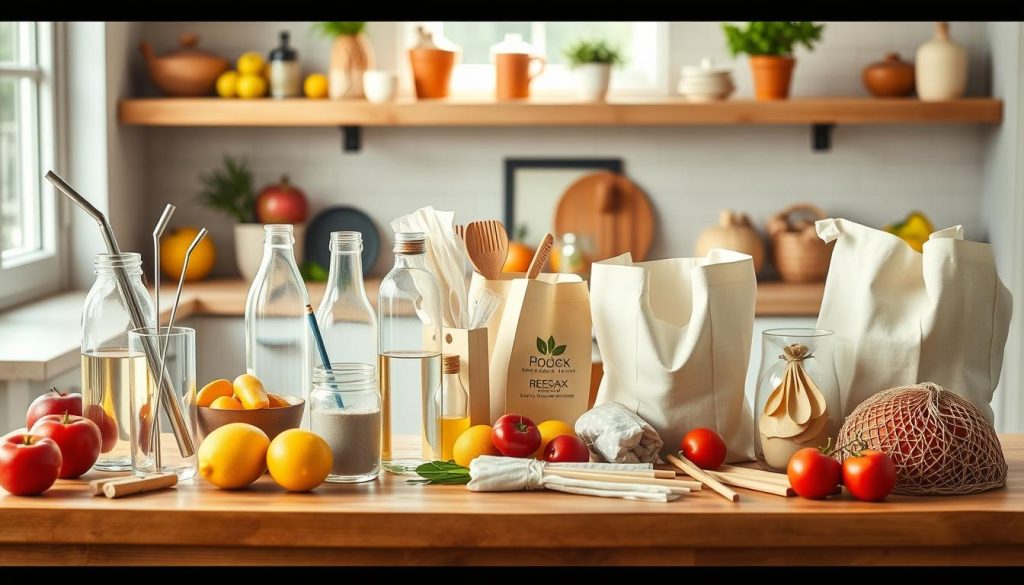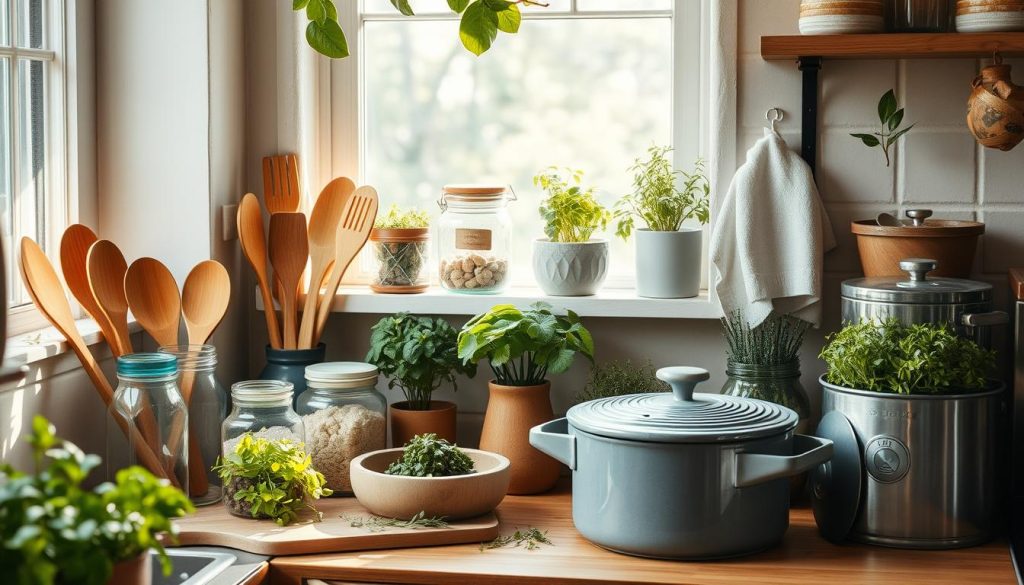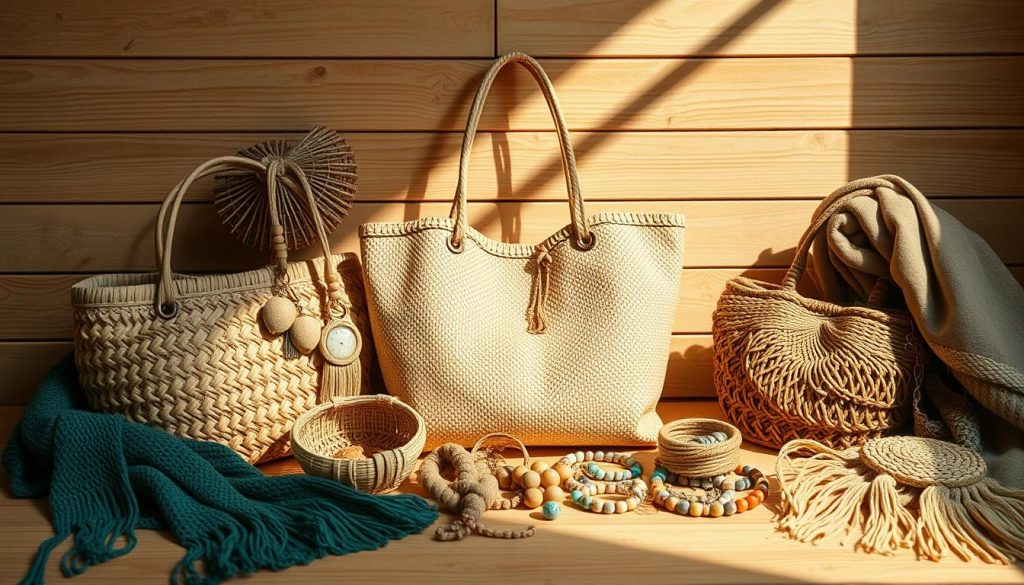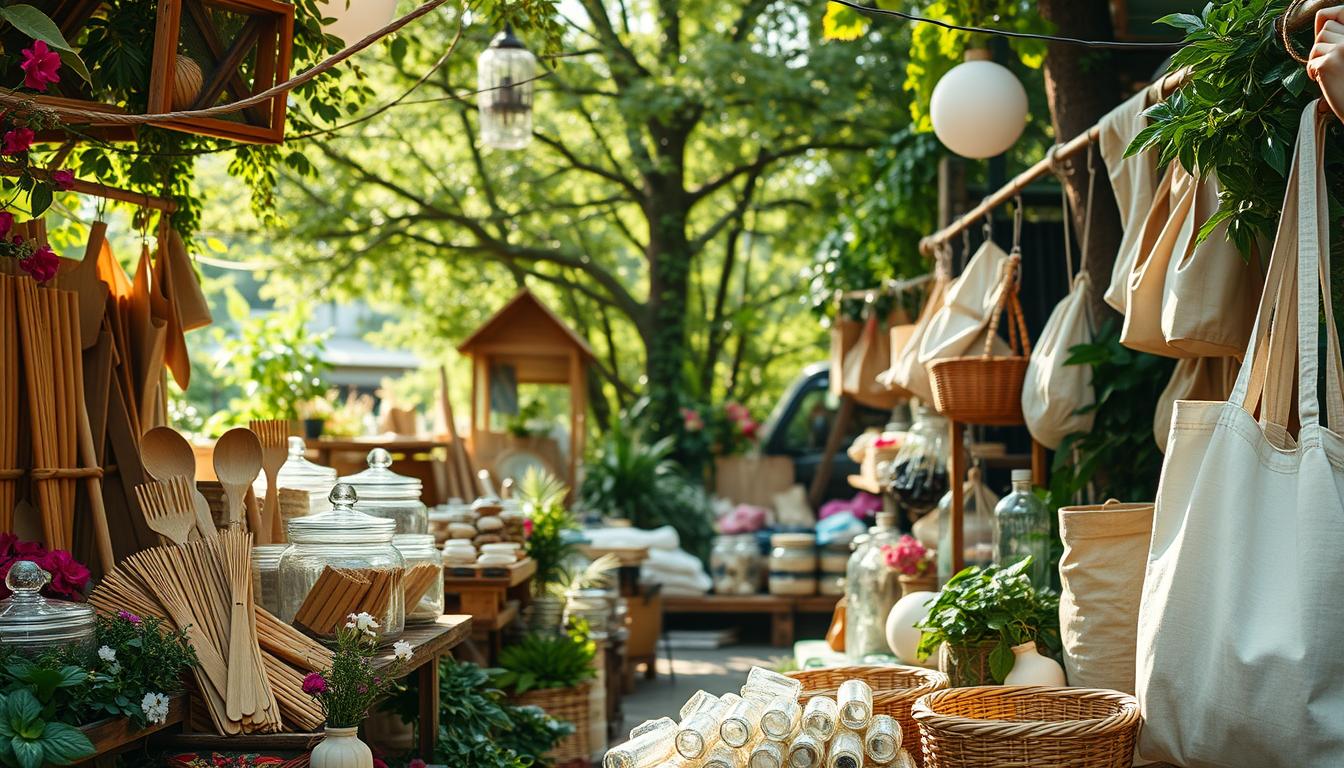I’m excited to explore the world of plastic-free brands and their role in sustainable living. As someone who cares about the environment, I’ve seen how these companies are leading the way. They use innovative packaging and offer eco-friendly products.
In this article, I’ll show you the rise of plastic-free brands and highlight some leaders in the field. I’ll also give you tips on how to add sustainable products to your daily routine. We’ll see how these brands are changing the way we shop and helping the planet.
Are you ready to find great alternatives to plastic and make easy changes that help the environment? Let’s start this green journey together and see how we can make a difference in our future!
The Rise of Plastic-Free Brands in Sustainable Living
More people are choosing plastic-free brands as part of a zero-waste lifestyle. This change shows growing awareness of plastic pollution and a push for ethical consumerism. Companies are now offering eco-friendly alternatives to everyday items.
Understanding the Impact of Plastic Pollution
Plastic pollution is harming our environment badly. It’s filling our oceans, hurting wildlife, and getting into our food. Studies show we make over 300 million tons of plastic waste yearly. This highlights the need for us to change how we use plastic.
How Eco-Conscious Consumers Drive Change
Consumers are key in pushing for change. By picking plastic-free options, we tell companies what we want. This demand has led to more brands offering sustainable products, like reusable water bottles and biodegradable packaging.
The Benefits of Supporting Plastic-Free Companies
Choosing plastic-free brands does more than help the environment. These companies focus on quality, durability, and new designs. By picking their products, we help create a circular economy, cut our carbon footprint, and encourage others to live sustainably.
- Reduced environmental impact
- Higher quality, longer-lasting products
- Support for innovative, eco-friendly solutions
- Inspiration for others to make sustainable choices
Innovative Packaging Solutions in Eco-Friendly Products
I’m excited to share some groundbreaking packaging solutions that eco-friendly brands are adopting. These innovations are changing the game for sustainable products and reducing our environmental impact.
One of the most promising developments is the use of biodegradable materials in packaging. Companies are now creating containers from plant-based sources like cornstarch and sugarcane. These materials break down naturally, leaving no harmful residues behind.
Reusable containers are another fantastic innovation in eco-friendly packaging. Many brands now offer refill stations or take-back programs for their products. This approach drastically cuts down on waste and encourages customers to be more mindful of their consumption habits.
Some companies are taking it a step further with edible packaging. Imagine eating your sandwich wrapper or dissolving your shampoo bottle in water! While still in early stages, this concept shows real potential for eliminating packaging waste entirely.
- Mushroom packaging: Made from agricultural waste and fungal mycelium
- Seaweed-based materials: Biodegradable and ocean-friendly
- Paper-based solutions: Recyclable and compostable alternatives to plastic
These innovative packaging solutions are not just good for the planet; they’re also driving consumer interest in sustainable products. As more brands adopt these eco-friendly practices, we’re moving closer to a world where packaging doesn’t come at the cost of our environment.
Zero-Waste Pioneers: Brands Leading the Way
I’ve seen more brands going green, embracing a zero-waste lifestyle. Let’s look at some leaders in sustainable products making a big difference.
Lush Cosmetics: Naked Beauty Revolution
Lush Cosmetics has changed the beauty world with their “naked” line. They’ve replaced plastic with solid shampoos, conditioners, and lotions. This move cuts down on waste and encourages a zero-waste lifestyle.
Package Free Shop: One-Stop Sustainable Store
Package Free Shop has a huge selection of eco-friendly items. They offer everything from reusable straws to compostable dish brushes. Their focus on zero-waste packaging is setting a new retail standard.
Who Gives a Crap: Toilet Paper with a Purpose
Who Gives a Crap shows that even toilet paper can be green. They make their products from recycled paper and bamboo, wrapped in colorful paper instead of plastic. They also give 50% of their profits to help with sanitation in poor countries.
| Brand | Key Product | Sustainability Feature |
|---|---|---|
| Lush Cosmetics | Solid Shampoo Bars | Packaging-free beauty products |
| Package Free Shop | Reusable Straws | Plastic-free alternatives for everyday items |
| Who Gives a Crap | Recycled Toilet Paper | Eco-friendly materials and charitable giving |
These brands prove that living zero-waste can be easy and fashionable. By choosing to buy from them, we’re helping make our planet cleaner, one purchase at a time.
Reusable Alternatives for Everyday Items

I’m excited to share some game-changing reusable alternatives that can transform your daily routine. These swaps not only reduce plastic waste but also help you embrace a zero-waste lifestyle and green living practices.
- Stainless steel water bottles: Ditch single-use plastic bottles and stay hydrated sustainably.
- Beeswax food wraps: Replace plastic wrap with these natural, reusable food covers.
- Cloth produce bags: Say goodbye to flimsy plastic bags when shopping for fruits and veggies.
- Bamboo cutlery set: Perfect for on-the-go meals without disposable plastics.
- Glass food containers: Store leftovers and pack lunches in these durable, long-lasting containers.
Switching to these reusable alternatives offers both environmental and economic benefits. By investing in quality, long-lasting products, you’ll save money in the long run while reducing your carbon footprint.
To incorporate these items into your daily life, start small. Replace one single-use item at a time, allowing yourself to adjust to the change. Before you know it, you’ll be well on your way to a more sustainable lifestyle.
| Single-Use Item | Reusable Alternative | Estimated Lifespan |
|---|---|---|
| Plastic water bottle | Stainless steel bottle | 5-10 years |
| Plastic wrap | Beeswax wrap | 1 year (with proper care) |
| Plastic produce bag | Cloth produce bag | 2-3 years |
| Disposable cutlery | Bamboo cutlery set | 2-3 years |
| Plastic food container | Glass food container | 10+ years |
By embracing these reusable alternatives, you’re taking a significant step towards a zero-waste lifestyle and contributing to a greener, more sustainable future.
Plastic-Free Brands in Personal Care and Hygiene
Personal care routines often include plastic products. But, a zero-waste lifestyle is achievable, even in the bathroom. Let’s look at some innovative, sustainable products that are making a difference.
Ethique: Solid Beauty Bars for Hair and Body
Ethique is changing personal care with solid beauty bars. These bars are packed with shampoo, conditioner, and body wash in eco-friendly packaging. One bar replaces three plastic bottles, cutting down on waste while keeping you clean.
Dental Lace: Eco-Friendly Dental Floss
Dental Lace offers a green alternative for oral care. Their floss is made from silk and comes in a glass container you can refill. It’s a small step towards a zero-waste lifestyle.
Leaf Shave: Revolutionary Plastic-Free Razors
Leaf Shave solves the disposable razor issue with their all-metal razor. It’s built to last a lifetime, ending the need for plastic razors. The blades are recyclable, making it a sustainable choice for grooming.
These brands show that personal care can be both effective and eco-friendly. By picking these products, you’re caring for yourself and the planet.
Sustainable Kitchen and Home Goods

I’m excited to share some amazing sustainable products for your kitchen and home. These green living essentials are perfect for anyone looking to reduce their environmental impact. Let’s explore some fantastic reusable alternatives that will transform your living space!
Bamboo utensils are a game-changer in the kitchen. They’re durable, lightweight, and biodegradable. I love using them for cooking and serving. They add a touch of elegance to any table setting while being eco-friendly.
Glass food storage containers are another must-have. They’re perfect for keeping leftovers fresh and reducing plastic waste. Plus, they’re microwave and dishwasher safe, making them super convenient.
Organic cotton cleaning cloths are a sustainable alternative to paper towels. They’re reusable, absorbent, and easy to wash. I’ve found they last much longer than traditional cleaning products.
| Product | Material | Benefits |
|---|---|---|
| Utensils | Bamboo | Biodegradable, durable, lightweight |
| Food Storage | Glass | Plastic-free, microwave safe, long-lasting |
| Cleaning Cloths | Organic Cotton | Reusable, absorbent, washable |
By incorporating these sustainable products into your home, you’ll be taking significant steps towards greener living. These reusable alternatives not only reduce waste but also add style and functionality to your living space.
Biodegradable Materials: The Future of Eco-Friendly Packaging
Biodegradable materials are changing the game in eco-friendly packaging. I’ve seen amazing progress in this area. New solutions are helping protect our environment.
Mushroom Packaging: A Revolutionary Alternative
Mushroom packaging is a cool eco-friendly option. It’s made from mycelium, the fungi’s root system. This material is grown into shapes for packaging.
Seaweed-Based Materials: Ocean-Friendly Solutions
Seaweed-based materials are also promising for packaging. They dissolve in water, leaving no trace. They’re great for single-use items like food wrappers.
Plus, growing seaweed helps absorb carbon dioxide. It’s good for our oceans.
Plant-Based Plastics: Pros and Cons
Plant-based plastics are made from renewable resources like corn or sugarcane. They’re a better choice than traditional plastics. But, they come with challenges.
| Pros | Cons |
|---|---|
| Renewable resource-based | May require specific conditions to biodegrade |
| Reduces carbon footprint | Can contaminate recycling streams if not properly sorted |
| Biodegradable in industrial composting facilities | Higher production costs compared to traditional plastics |
These new biodegradable materials are shaping the future of packaging. As consumers, we can help by choosing products with sustainable packaging.
Fashion Forward: Plastic-Free Clothing and Accessories

The fashion world is changing for the better. I’m thrilled to talk about how sustainable products are changing our clothes. Now, we have plastic-free clothes and accessories leading the way to a greener future.
New brands are using organic and recycled materials. These choices help the planet and cut down on ocean pollution. Let’s look at some top companies in sustainable fashion:
- Patagonia: Known for their recycled polyester fleeces and organic cotton tees
- Tentree: Plants ten trees for every item purchased
- Reformation: Uses eco-friendly fabrics and renewable energy in production
Plant-based materials are also becoming popular. Piñatex, made from pineapple leaves, is a leather alternative. Cork and bamboo are great for accessories, blending style with sustainability.
| Material | Benefits | Common Uses |
|---|---|---|
| Organic Cotton | Pesticide-free, biodegradable | T-shirts, dresses, jeans |
| Recycled Polyester | Reduces plastic waste | Activewear, jackets |
| Piñatex | Vegan, uses agricultural waste | Shoes, bags, wallets |
Choosing sustainable products is more than just fashion. It’s about joining a movement towards better consumption and production. It’s a small step that can make a big difference in the fashion world and beyond.
Green Living: Incorporating Plastic-Free Brands into Your Lifestyle
Starting a green living journey can seem daunting. But, I’ve learned that beginning with small steps is the best approach. Let’s look at some easy ways to make this transition smoother and more fun.
Starting Small: Easy Swaps for Beginners
For beginners, I suggest starting with simple changes:
- Replace plastic water bottles with a reusable one
- Switch to bamboo toothbrushes
- Use cloth bags for grocery shopping
- Opt for bar soaps instead of liquid soaps in plastic containers
Creating a Plastic-Free Home: Room by Room Guide
To make your home plastic-free, start with one room at a time:
| Room | Plastic-Free Alternatives |
|---|---|
| Kitchen | Glass containers, beeswax wraps, metal straws |
| Bathroom | Bamboo toilet paper, safety razors, shampoo bars |
| Bedroom | Organic cotton bedding, wooden hangers, natural air fresheners |
| Living Room | Wooden or bamboo furniture, plant-based candles, reusable coasters |
Overcoming Challenges in Plastic-Free Living
Living without plastic can be tough. But, planning ahead and carrying reusable items helps a lot. It’s all about making progress, not being perfect. By choosing plastic-free brands, we help create a better future.
The Future of Ethical Consumerism and Environmental Conservation
I’m excited about the future of ethical consumerism and its role in environment conservation. As more people learn about plastic pollution, they’re choosing eco-friendly products. This is making companies work harder to create sustainable alternatives for everyday items.
The rise of plastic-free brands is changing the market. These companies are not just selling products; they’re promoting a lifestyle change. By supporting these businesses, consumers are voting with their wallets for a cleaner planet. This trend is likely to continue, with more industries adopting sustainable practices.
Looking ahead, I see a world where ethical consumerism becomes the norm. As we face the challenges of climate change, our shopping choices will play a crucial role in protecting our environment. By embracing plastic-free options and supporting innovative brands, we can all contribute to a greener future. It’s up to us to make smart choices and push for positive change in our communities.
